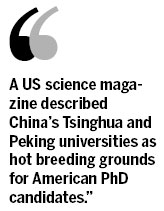Comment
Colleges must look within to stem tide of students moving abroad
(China Daily)
Updated: 2010-06-17 10:38
 |
Large Medium Small |
According to CCTV, the number of students who study abroad directly after high school is rapidly increasing, against the backdrop of fewer students sitting for the national college entrance examination.
Study abroad used to be the last choice of high school graduates - or the choice of those who failed the exam. But now it has become the priority for many first-class students.
Some begin preparing from the first year of senior high school. During the application season, visa officials from the US, Canada, Australia and France all show their welcoming attitude toward Chinese students by releasing conditions for them to enter their countries.
In the increasingly fierce international competition for talent, Chinese institutes of higher learning are apparently ill-prepared. Reform of the country's higher education system has lagged far behind.
By 2008, 1.4 million Chinese students had studied abroad. Of those, only 390,000 returned to China after graduating. The country has invested hugely in the basic education of Chinese students. But many choose to go abroad for their higher education - and careers.

It is a big loss of talent for China. A US science magazine described China's Tsinghua and Peking universities as hot breeding grounds for American PhD candidates.
The fact that more high school graduates choose overseas universities exposes problems in higher education in China.
The past years have witnessed a frenzied expansion of colleges and universities. Many schools, however, have just focused on scale expansion, but neglected quality improvement. Some even set profit as their highest pursuit.
Outdated curriculums and lax management make some colleges and universities less and less appealing.
Furthermore, many colleges and universities are no longer the ivory tower. Moral degradation prevails as cheating and plagiarizing in academic papers all run rampant. The credibility of Chinese institutes of higher learning is decreasing.
It is understandable for parents to send their children to study abroad when they can afford it.
We hope the international talent competition can wake up Chinese schools of higher learning. They should lose no time in altering their manner of operations. They should stop scale expansion, but attach more attention to improving teaching quality, restrict the pursuit of hardware such as modern high-rises. Instead, they must strengthen their software building. It starts with restoring professional morals.
Chinese schools should be more active in introducing international talent and strengthen cooperation with world-renowned universities. If Chinese students can enjoy world-class higher education within China, who would strive to study abroad?
Excerpts from a comment in Beijing Youth Daily, June 11.